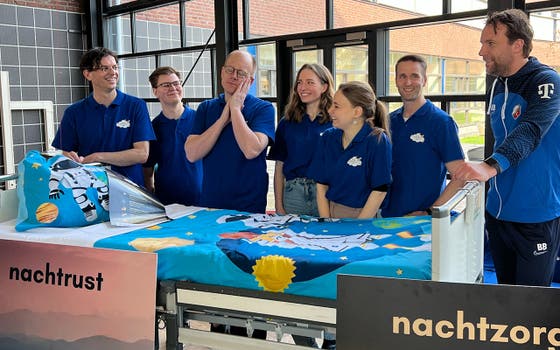Launch of the Sleep Discovery Lab

Today on World Sleep Day, the Sleep Discovery Lab is being launched at the WKZ. The Sleep Discovery Lab is a virtual platform dedicated to sleep research and innovation.
Lees artikel in het Nederlands >
As adults, we spend a third of our lives sleeping. Very young children even sleep more than they are awake. Yet we know relatively little about sleep. With the launch of the Sleep Discovery Lab, UMC Utrecht wants to contribute to more knowledge about sleep.
The Sleep Discovery Lab is a virtual platform where healthcare professionals, researchers, students and patients can collaborate, share ideas and find information in the field of sleep. The mission of the Sleep Discovery Lab is to encourage innovative and interdisciplinary research on sleep.
Sleep is indispensable
Jeroen Dudink, paediatrician and sleep researcher, says: "Sleep plays an important role in being healthy and sick. After all, health is a 24-hour phenomenon. Currently, sleep is not given the role it deserves. Therefore, with the Sleep Discovery Lab, we aim to make sleep an indispensable part of research, care and education within healthcare." And because sleep is not only an important issue in healthcare, the Sleep Discovery Lab is also looking for social partners. "For example, we are already working with FC Utrecht, with whom we recently recorded a podcast on the importance of sleep for top athletes," Jeroen says.
The kick-off of the Sleep Discovery Lab is today at the Wilhelmina Children's Hospital (WKZ) of the UMC Utrecht. The WKZ, in collaboration with Kenniscentrum Revalidatiegeneeskunde Utrecht (KCRU) and the Prinses Maxima Centrum, is already doing research into the role of sleep in early development, during illness and rehabilitation of children. Olaf Verschuren, researcher in paediatric rehabilitation, says: "Sleep is important for young and old and should play an important role in all hospitals and rehabilitation centres." Jeroen adds: "The launch of the Sleep Discovery Lab is therefore an important first step towards a sleep-friendly hospital for patients and staff.”
